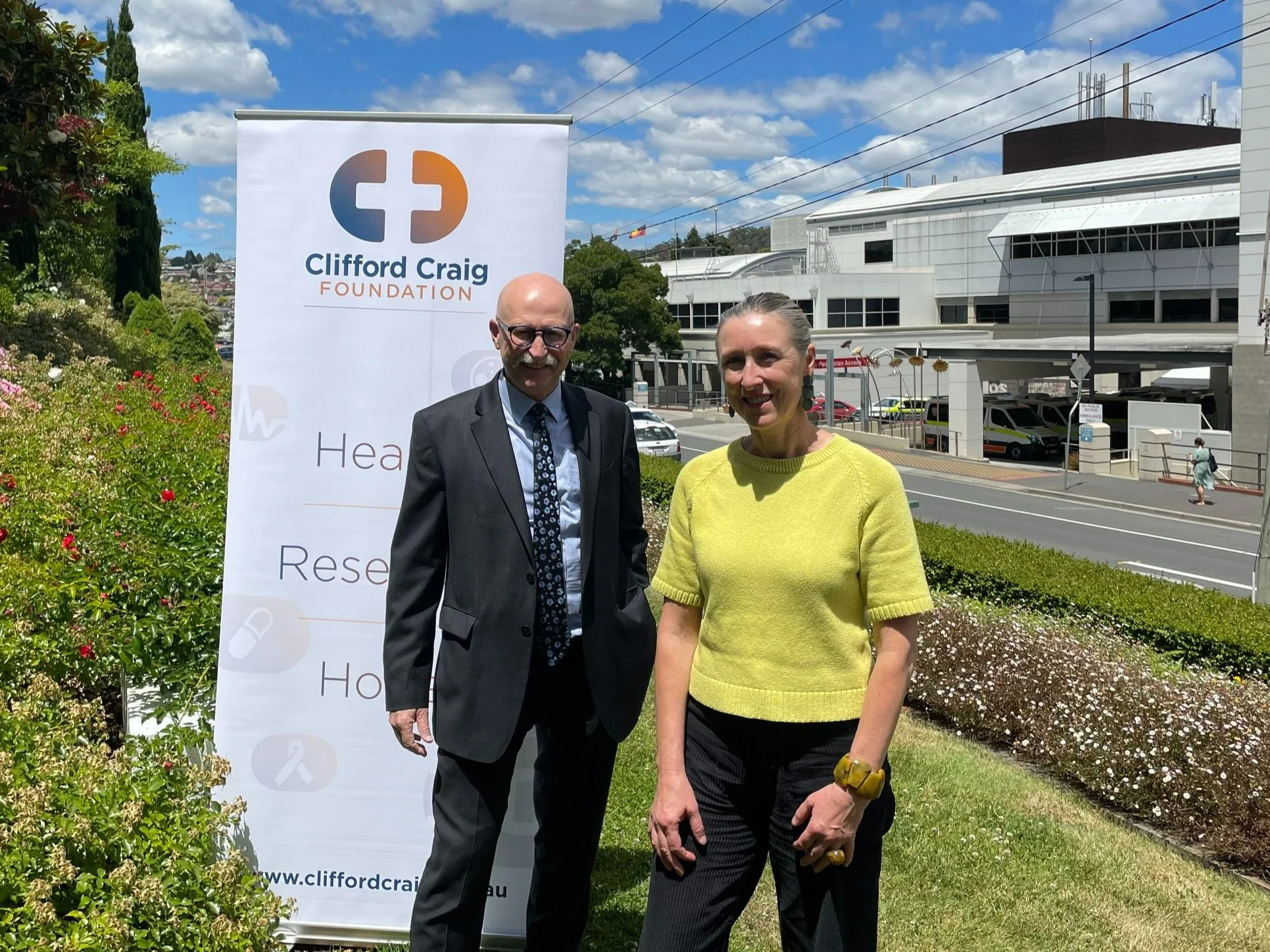Funding secured for world-first COVID-19 vaccine trial
Clifford Craig Foundation chief executive Peter Milne, with Infectious Disease Specialist and COVULPOP Chief Investigator Professor Katie Flanagan.
December 2021
A world-first trial examining the immune response to COVID-19 vaccines in vulnerable populations, including pregnant women, has been given the green light thanks to a $360,000 funding commitment from the Clifford Craig Foundation.
Led by Launceston General Hospital Infectious Disease Specialist Professor Katie Flanagan, the COVULPOP trial will quantify and compare vaccine-induced humoral and cellular immune responses to COVID-19 vaccination between pregnant women, the elderly, healthy adult men and non-pregnant women.
It will be the first study to use Systems Vaccinology to study COVID-19 vaccine responses in pregnant women and the elderly, and the first to investigate the link between vaccine responses diet, microbiota inflammation, immunity and mood disorders.
In what marks the most significant individual medical research funding commitment in its 30-year history, the Clifford Craig Foundation will provide $360,000 over 2 years for Professor Flanagan to carry out the study in Tasmania, in partnership with the University of Tasmania’s School of Health Sciences, the Royal Melbourne Institute of Technology, Monash University and the Peter Doherty Institute.
The study will bring together a team of researchers already publishing cutting edge research in the field of SARS-CoV-2 immunology and is expected to generate unprecedented insights into the immunological effects of COVID-19 vaccines.
As Professor Flanagan explained, while multiple vaccines have been approved based on data indicating they are safe and protect against COVID-19, our understanding of their effects in pregnant women and the very elderly – two groups at increased risk of developing severe COVID-19 – are less robust.
“Currently, we have limited data on responses to COVID-19 vaccination in pregnant women,” Professor Flanagan said.
“As we move towards living with SARS-CoV-2, we are likely to need regular boosters, particularly against emerging virus variants of concern.
“Women may therefore need to receive a booster COVID-19 vaccination during their pregnancy.
“We don’t know how long vaccine-induced immunity will last following COVID-19 vaccination in pregnancy nor the efficiency of transfer of protective antibodies to the foetus.
“It is therefore imperative to answer these questions for future COVID-19 vaccine programming.”
The trial will require up to 200 pregnant women, 120 young adults aged 18-45, and 120 older adults aged 65 and older.
Healthy pregnant women will be recruited via their obstetric clinic early in their pregnancy, while healthy men, non-pregnant women and elderly patients will be recruited from the LGH and the Launceston Medical Centre.
The trial will initially focus on the Pfizer vaccine, but will also test other vaccines including Moderna or Novavax – should it become available for use in Australia.
Clifford Craig Foundation chief executive Peter Milne said the Foundation was proud to bring world-class research to Northern Tasmania.
“This trial further enhances the vision of the Clifford Craig Foundation for the Launceston General Hospital to be recognised as a centre of research excellence not just in Australia, but around the world,” he said.
“Professor Flanagan’s work is a great example of how the Foundation is funding medical research that not only attracts additional research funding to our region, but also creates employment opportunities and helps retain high-calibre clinicians to work in Northern Tasmania.
“We also shouldn’t overlook the fact that Professor Flanagan is an integral member of the federal government’s ATAGI Committee, and has been the forefront in our fight against COVID-19.
“Our community should be extremely proud that because of its ongoing support, the Clifford Craig Foundation is able to assist with the delivery of world class research projects such as this.”

